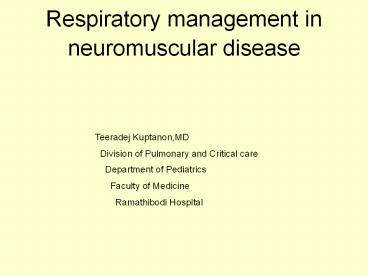Respiratory%20management%20in%20neuromuscular%20disease - PowerPoint PPT Presentation
Title:
Respiratory%20management%20in%20neuromuscular%20disease
Description:
Respiratory management in neuromuscular disease Teeradej Kuptanon,MD Division of Pulmonary and Critical care Department of Pediatrics Faculty of Medicine – PowerPoint PPT presentation
Number of Views:260
Avg rating:3.0/5.0
Title: Respiratory%20management%20in%20neuromuscular%20disease
1
Respiratory management in neuromuscular disease
Teeradej Kuptanon,MD Division of Pulmonary and
Critical care Department of Pediatrics
Faculty of Medicine Ramathibodi Hospital
2
Respiratory management in neuromuscular disease
- Medical problems
- Psychosocial problems
- Ethical problems
3
Medical problems
- Specific treatment
- Respiratory
- Gastroesophageal reflex
- Constipation
- Pulmonary Hypertension
- Malnutrition
- Scoliosis
4
Non-Cardiopulmonary Complications in Prolonged
Survivors of Duchene Muscular Dystrophy.
Complication Number of patients
Therapeutic interventions Malnutrition/dysphagia
15 Gastrostomy tube
placement Nephrolith
iasis 6
Lithotripsies, cystoscopies,
ureteral stents Diabetes mellitus 2
Insulin Deep venous thrombosis
2 Anti-coagulation Gall
stones 1
Potential need for
surgery Inflammatory bowel disease 1
Medical
Ped pulmonology411113-1117(2006)
5
Respiratory
- Improve respiratory muscle function
- Mucus clearance technique
6
Improve respiratory muscle function
- Non invasive positive pressure ventilation
(NIPPV) - Respiratory muscle training
- General nutrition
- electrolyte
- oxygen
- sleep position
7
NIPPV
- Indication PSG
- FEV1, FVC1 lt 40
- PaCO2 gt 45 mmHg
- Base excess gt 4 mmol/L
- Indication ?????? NIPPV
- Symptomatic day time hypercapnia
- Nocturnal hypercapnia PaCO2 gt 50 mmHg, gt 50 TST
George CF, Guilleminault C. Sleep and
Neuromuscular Diseases. In Principles and
practice of sleep medicine, 20058318.
8
(No Transcript)
9
Respiratory muscle training
10
normal subjects, normal controls, NMD
subjects, NMD controls.
Praud JP, et al. Kendigs Disorders of the
Respiratory Tract in Children, 2006733-746.
11
Mucus clearance technique
- Physical therapy
- Cough assist
12
Psychosocial problems
Neurologist Pulmonologist Cardiologist Orthopedist Nutritionist Nurse practitioner
Care manager Social worker Physical therapist Occupational therapist Speech therapist
13
Ethical problems
- End of life care
14
Case conference ?.?. ???? 6 ?? ???????
juvenile rheumatoid arthritis with
encephalopathy ??????? admit ???????
pseudomonas septicemia ????????? ceftazidime
amikacin ?????????????? ??????????????
meropenem
15
?????? 7 ?? ??. ?????????????? stridor ????????
??????????????? ?? fiberoptic bronchoscopy ?????
arythenoids ??? ??? ??????????????? arythenoids
collapse ??? vocal cord ?????? chronic
aspiration ??? gastroesophageal reflux (GER)
???????? PICU
16
Physical examination inspiratory and expiratory
stridor, RR 36 /min poor air entry, prolonged
inspiratory phase ??? dexamethasone, adrenaline,
pulmicort neb ???????? upper airway obstruction
?????????
17
(No Transcript)
18
Problem lists
- Upper airway obstruction due to laryngomalacia
secondary to GER - Encephalopathy with central hypoventilation
19
???????????????????????? ?????????????????
A. CPAP B. BiPAP
20
24 hour BiPAP spontaneous mode IPAP 20 EPAP 8
cmH2O
21
CASE CONFERENCE
- 6-year-old girl with
- cyanosis during sleep
22
- CC ????????????????????? 5 ?????
- PI 5 ???????????????????? ????????????????????
???? 18.00 ?. ?????????????????????????? ??? 30
???? ????????????????????? ????????????????
?????????? ????????????? ?????????????????????????
?????????????
23
- Physical examination
- General Appearance Obese(W/H 169 ), eumorphic,
sleepy girl with shallow breath, but decreased
and paradoxical chest movement without snoring. - Vital signs
- BT 37? C, PR 128/min,
- RR 28/ min, BP 100/ 60 mmHg
- fall asleep at OPD SpO2 64
- awake SpO2 95 (room air)
24
- Physical examination
- HEENT not pale, no engorged neck vein
- HEART normal S1 S2 , no murmur
- LUNGS clear
- ABDOMEN no organomegaly
- EXTREMITIES no digital clubbing
25
(No Transcript)
26
(No Transcript)
27
What do you plan to do next?
28
negative inspiratory force -20 cmH2O
29
Management On nasal BiPAP 15/5 cmH2O
RR 20 / min
30
(No Transcript)
31
Thank you
- for your attention































